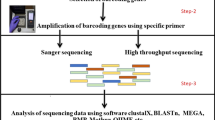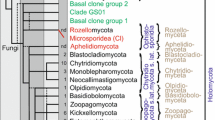Abstract
The Roseobactergroup appears to be one of the most important groups of marine bacteria, present in high abundance in various habitats. During the last 25 years a multitude of strains affiliated with this group and showing very different physiological features was obtained. The characteristics of the isolates reflect their adaptations to different ecological niches. Analysis of a constantly increasing number of Roseobacter genomes indicates an adaptive structure and at least partially explains the success of this bacterial group.
Similar content being viewed by others
Literatur
Giebel H-A, Kalhoefer D, Lemke A et al. (2011) Distribution of Roseobacter RCA and SAR11 lineages in the North Sea and characteristics of an abundant RCA isolate. ISME J 5:8–19
Pintado J, Pérez-Lorenzo M, Luna-González A et al. (2010) Monitoring of the bioencapsulation of a probiotic Phaeobacter strain in the rotifer Brachionus plicatilis using denaturing gradient gel electrophoresis. Aquaculture 302:182–194
Göker M, Klenk H-P (2013) Phylogeny-driven target selection for genome-sequencing (and other) projects. Stand Genomic Sci 8:360–374
Dogs M, Voget S, Teshima H et al. (2013) Genome sequence of Phaeobacter inhibens type strain (T5T), a secondary metabolite producing member of the marine Roseobacter clade, and emendation of the species description of Phaeobacter inhibens. Stand Genomic Sci 9:334–350
Klenk H-P, Göker M (2010) En route to a genome-based taxonomy of Archaea and Bacteria? Syst Appl Microbiol 33:175–182
Thole S, Kalhoefer D, Voget S et al. (2012) Phaeobacter gallaeciensis genomes from globally opposite locations reveal high similarity of adaptation to surface life. ISME J 6:2229–2244
Petersen J (2011) Phylogeny and compatibility: plasmid classification in the genomics era. Arch Microbiol 193:313–321
Vollmers J, Voget S, Dietrich S et al. (2013) Poles apart: Arctic and Antarctic Octadecabacter strains share high genome plasticity and a new type of xanthorhodopsin. PLoS One 8:e63422
Wemheuer B, Güllert S, Billerbeck S et al. (2013) Impact of a phytoplankton bloom on the diversity of the active bacterial community in the southern North Sea as revealed by metatranscriptomic approaches. FEMS Microbiol Ecol, doi: 10.1111/1574-6941.12230
Luo H, Löytynoja A, Moran MA (2012) Genome content of uncultivated marine Roseobacters in the surface ocean. Environ Microbiol 14:41–51
Author information
Authors and Affiliations
Corresponding author
Additional information
Sonja Voget 1996–2002 Biologiestudium an der Universität Göttingen; dort 2006 Promotion (Dr. rer. nat.) im Institut für Mikrobiologie und Genetik. Seit 2006 wissenschaftliche Mitarbeiterin am Goettingen Genomics Laboratory (G2L) der Universität Göttingen.
Markus Göker 1993–1999 Biologiestudium an der Universität Heidelberg. 2004 Promotion (Dr. rer. nat.), 2008 Habilitation an der Universität Tübingen. Seit 2008 wissenschaftlicher Mitarbeiter des Leibniz-Instituts DSMZ — Deutsche Sammlung von Mikroorganismen und Zellkulturen, Braunschweig. Seit 2010 Projektleiter im SFB „Roseobacter“.
Thorsten Brinkhoff 1988–1994 Biologiestudium an der Universität Osnabrück. 1998 Promotion (Dr. rer. nat.) am Max-Planck-Institut für Marine Mikrobiologie in Bremen. Seit 1998 wissenschaftlicher Mitarbeiter am Institut für Chemie und Biologie des Meeres (ICBM) der Universität Oldenburg. 2008 Habilitation im Fachgebiet Mikrobiologie. Seit 2010 Projektleiter im SFB „Roseobacter“.
Rights and permissions
About this article
Cite this article
Voget, S., Göker, M. & Brinkhoff, T. Genomik: Grundlage zum Verständnis des Erfolgs von Roseobacter-Gruppe. Biospektrum 20, 279–282 (2014). https://doi.org/10.1007/s12268-014-0441-2
Published:
Issue Date:
DOI: https://doi.org/10.1007/s12268-014-0441-2




